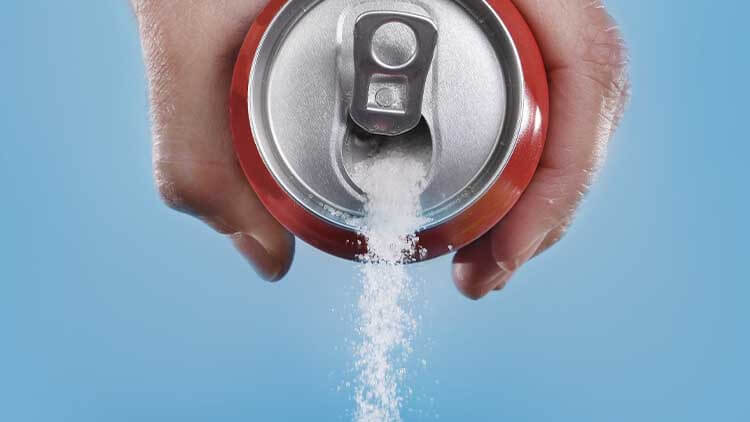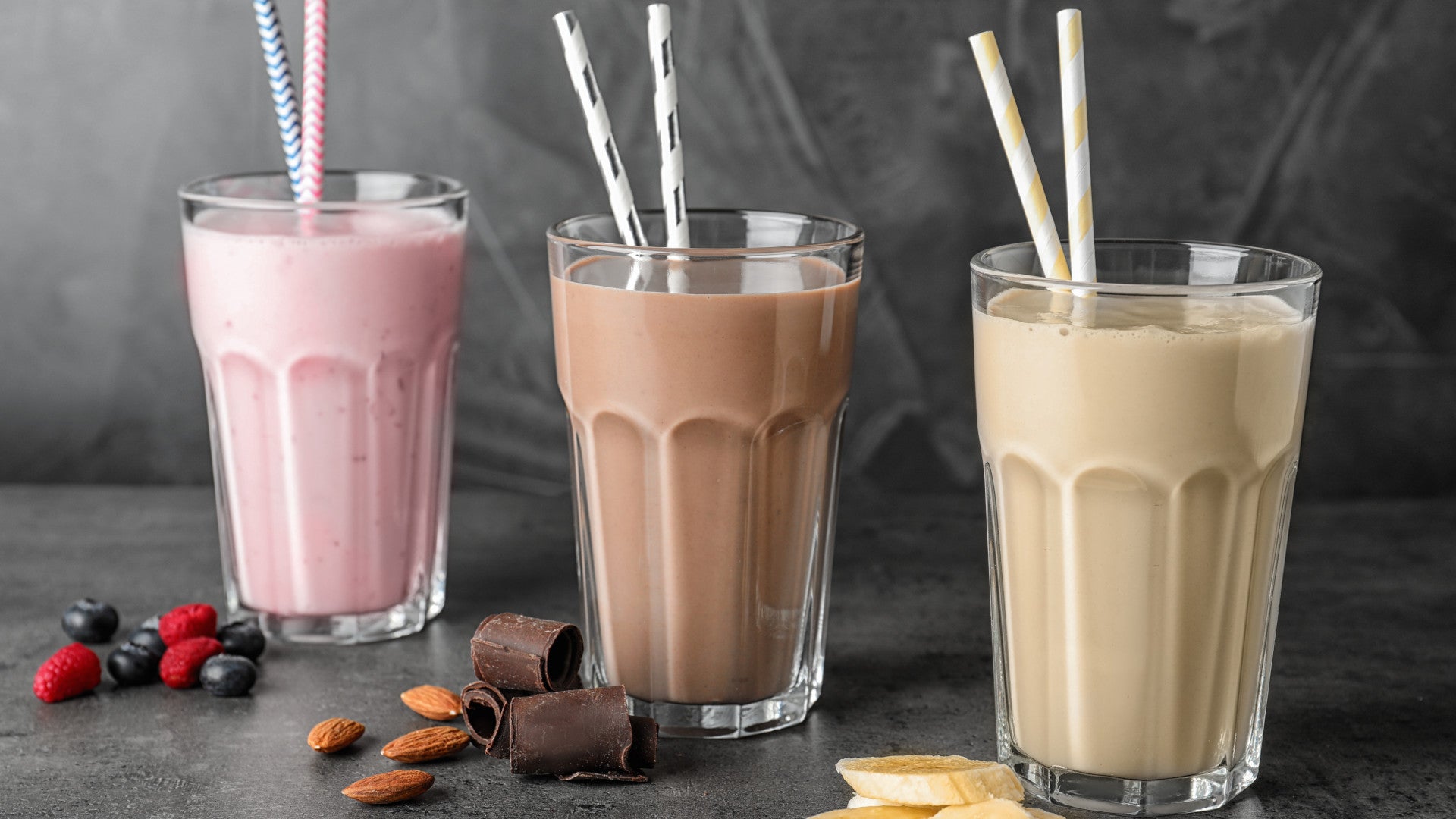For years we have been told that drinking diet soda is better and healthier for us than consuming their full sugar alternatives. Yet this may no longer be true…
There are growing concerns that diet sodas can hinder the good bacteria in our stomachs, trigger endorphins spikes in the brain, and may even cause you to put on weight instead of helping you to lose it.
So who is right and who is wrong in the ‘is diet soda bad for you’ debate? In this article, we shall explore the idea of diet soda and weight gain and all its other potential risks…
- Is diet soda bad for you?
- Does diet soda have any nutritional value?
- Does diet soda make you gain weight?
- Can you drink diet soda on keto or low carb diets?
- Are there any diet soda health risks?
- Is diet soda better for you than regular soda?

Is diet soda bad for you?
And this is the big question: is it bad or is diet soda actually good for you? Honestly, it falls into both categories.
You see, on the one hand it has been marketed for years to diabetics or to anyone wishing to reduce their sugar and calorie intake because instead of using sugar, they incorporate artificial sweeteners into their recipe such as aspartame, cyclamate, saccharin, etc.
Now, on the surface they do sound promising as in theory less calories and sugar SHOULD encourage weight loss. However, there has been an increasing amount of research linking both normal soda AND diet soda to an increased risk of mortality – YES death – and heart disease.
Why? Because of the very same artificial sweeteners that they say are better for you than sugar!
And this claim isn’t made lightly. But is based on two large scale studies consisting of 37,000 middle aged men and 80,000 middle aged women who were studied for over 30 years.
Those who consumed higher intakes of artificial sweeteners of 4+ servings a day, were found to not only be younger (in general) than those who drank it less frequently; they were also more likely to have hypertension, a higher BMI and be overweight.
Now, you could argue that lifestyle choices may have influenced some of their findings. After all, not only do our jobs encourage us to lead a more sedentary lifestyle – leading to weight gain from lack of activity – we have also lived through many years of marketing that has told us that diet soda and weight loss is possible.
When faced with this combination, it is little wonder that current generations drink more diet soda than others. We’ve been lead to believe they are good for us.
Age aside, what is clear from this research is that artificial sweeteners do have the potential to increase body weight AND cardiometabolic risk – IF consumed in excess.
The Science
At the root of this theory is the idea that due to the ‘intense sweetness’ of artificial sweeteners we are prone to developing a natural preference for sweets.
And this makes sense if you think about it, as sugars as a whole tend to trigger cravings for more sugary foods (leading to overeating).
Whilst artificial sweeteners aren’t sugars themselves; they can still stimulate this desire for sweet and sugary treats AS WELL AS overindulging in food.
Similarly, artificial sweeteners are reputed to encourage insulin responses and alter gut microflora – affecting insulin resistance. Neither of which are good for your body.
YET this is not all you need to consider when asking yourself ‘is diet soda bad or good for you?’ You should also reflect on the following questions before you make a decision…
Does diet soda have any nutritional value?
Diet sodas may contain little to no calories – which sounds great if you’re trying to lose weight – however, they have also got no nutritional value.
In fact, if you were to look at their ingredients list, you would discover that they are made up of:
- Carbonated water – usually created by dissolving carbon dioxide into water under pressure.
- Artificial or natural sweeteners – artificial sweeteners such as aspartame, saccharin, sucralose and stevia (an herbal sweetener) are 200-13,000 times sweeter than regular sugar.
- Colors
- Flavors – these can range from natural juices to artificial flavors e.g. fruits, berries, herbs and cola.
- Preservatives
- Food additives
- Acids – sometimes citric, malic and phosphoric acid are included in sodas to make them taste tarter. Whilst this may sound great for your tongue, they can also cause tooth enamel erosion.
- Vitamins and minerals – before you shout ‘nutritious’, these are rarely put in diet sodas and when they are, they are only done so they can market them as ‘healthy’.
- Caffeine – a lot of diet sodas contain caffeine, especially Diet Coke. In one can there is 46mg of caffeine whilst in Diet Pepsi there is 34mg.
But that is not all…
Look a little closer and you’ll also notice that alongside containing no calories, sugar, fat or protein, a 354ml can of Diet Coke contains a staggering 40mg of sodium – yep SALT.
And it doesn’t take a scientist to realize that this is way too much salt to be consuming in one drink.
Then of course, there is the fact that some diet sodas DO contain some sugar and a small amount of calories. For instance, some use a combination of sugar and sweeteners e.g. Coca-Cola Life contains Stevia (a natural sweetener) and 24g of sugar, meaning in one can you’re consuming 90 calories.
Does diet soda make you gain weight?
Here is where things get complicated because whilst most diet sodas are calorie free – so you’d assume that can help with weight loss – research now suggests that it may not be that simple.
For example, there have been multiple observational studies that have concluded that drinking large quantities of diet soda – and in turn lots of artificial sweeteners – CAN increase your chances of becoming obese and developing metabolic syndrome.
Similarly, other studies have noted elevations in appetite – due to these drinks stimulating hunger hormones e.g. altering your sweet taste receptors and encouraging dopamine responses in your brain.
Combine these elements together – no calories and heightened hunger responses – and you may find yourself eating more sweets or calorie dense foods, and eventually putting on weight.
Yet does this research apply to people? Does diet soda make you fat? Well, technically it doesn’t (told you it was tricky).
For starters, when examining diet soda and weight gain in comparison to diet soda and weight loss these results have proven to not be as consistent in people as they are in animals.
Another theory surrounding diet soda and weight gain is that people with bad dietary habits tend to drink diet soda, so the weight gain they experience is due to their diet and NOT diet sodas.
Then of course there are the studies which support diet soda and weight loss. In one study, when overweight participants drank 24 ounces of diet soda or water a day for a year; the diet soda group lost 13.7lbs, whilst the water group lost only 5.5lbs.
So what are you to believe?
In our opinion, due to the cravings diet soda drinks can trigger, unless you have got the willpower to resist this added hunger or the temptation to fall into bad dietary habits; then there is a possibility it could indirectly lead to weight gain.
Stay strong, and these drinks could help you to reduce your calorie intake. It all depends on you…
Can you drink diet soda on keto or low carb diets?
There have been fears that fake sugars and artificial sweeteners may make drinking diet soda on keto impossible. Yet, this isn’t the case…
As long as you only drink it in moderation, diet sodas won’t stop you from entering into ketosis, nor will they affect low carb diets as they contain zero carbs.
For instance, your average Pepsi contains 41g of carbs; however, Diet Pepsi contains none.
The one downside though, is the worry that diet sodas can prompt hunger cravings, leading to the temptation for you to overeat (as mentioned before). In numerous studies on mice, researchers saw a correlation between overeating and synthetic sugars, due to elevations in appetite.
Because of this we advise you to be careful when adding diet soda to your keto or low carb diet. Whilst it may contain no carbs, it could spark a desire to eat more calorie-dense foods.
Are there any diet soda health risks?
We’ve talked a bit about diet sodas potential to cause weight gain and increased cravings – but what about other side effects of diet soda? Are there any potential health risks?
Worryingly there appears to be a few…
Dementia and Alzheimer’s risks
According to Boston University, those who drink diet soda are 3 times more likely to develop dementia or Alzheimer’s disease than those who don’t.
Brain health
There are growing concerns that diet sodas may damage your brain health by weakening its antioxidant defence system. Aspartame (an artificial sweetener) is believed to chip away at this system when subjected to long term consumption.
In one study, researchers noted imbalances between the antioxidant and pro-oxidant status in the brains of participants.
As a result, aspartame can lead to an increase in migraines and headaches as well as depression, anxiety, short term memory loss, fibromyalgia, hearing loss, weight gain, fatigue and even brain tumors – plus many others.
Kidney damage
Studies by the National Kidney Foundation have revealed that drinking several diet sodas a day, can spark declines in kidney function (in female subjects).
In fact, long term consumption (more than 20 years in the case of participants) can reduce kidney function by 30% according to Harvard researchers.
A separate study of over 15,000 people noted this risk increased dependent on the number of glasses ingested per week.
When they compared those who had less than 1 glass per week to those who drank more than 7 glasses; those that knocked back more than 7 had double the risk of developing kidney disease.
The cause of this heightened risk has been connected to diet sodas use of phosphorus that can trigger increased acid load in your kidneys.
Pregnancy
A study in Denmark found that drinking 1 diet soda a day could increase your chances of preterm delivery by 38%. Yet, should you drink 4 a day, this danger can rise to 78%.
Similar studies have seen the same kind of stats. For instance, a Norwegian study on over 60,000 pregnant women found the presence of artificial sweeteners – and also drinking regular soda – can elevate your chances of preterm delivery by 11%.
NOTE: these stats are based on observational studies. NONE explored why diet sodas may affect pregnancy.
Fatty liver
On a positive note – for a change – there has been evidence that switching from regular sodas to diet sodas can reduce the amount of fat around your liver. True, not all studies agree with this theory, but it does make a refreshing change from the other side effects of diet sodas.
Depression
More than one observational study on diet soda has linked drinking these beverages to depression.
In fact, these studies indicate that drinking more than 4 sodas a day can increase your chances of becoming depressed by 30%, whilst drinking diet soda increased this risk by another 22%.
Cardiovascular disease
Alongside elevating your blood pressure levels, diet soda has also been connected to heart disease.
During a review of 4 separate studies on over 227,000 people, for every serving of diet soda that consumed, there was a 9% increase in risk of them having high blood pressure.
In fact, drinking just 1 diet soda a day can boost your chances of having a heart attack according to the University of Miami. More worryingly, the dangers of heart disease are HIGHER with diet soda drinks than with regular soda.
Severe headaches
We mentioned aspartame earlier. Well, this artificial sweetener not only tastes 200 times sweeter than refined sugar; there have also been studies that have linked aspartame to painful headaches.
Acne
Diet soda may have the power to make you more prone to breakouts due to it dehydrating your skin.
This means, unless you make an effort to stay hydrated (preferably with water); you may suffer from acne whilst indulging in this drink on a regular basis.
Stroke
It should come as no surprise that by raising your risk of heart disease, it in turn can increase your chances of having a stroke.
True, this theory is based on the data of one observational study – and yes more investigations need to be done – but the potential risk should give you pause for thought.
Tooth erosion
Thanks to its acidic pH level – and the presence of malic, citric and phosphoric acid – drinking diet soda regularly could cause tooth decay/erosion.
In fact, one study suggests that the teeth of diet soda drinkers’ are just as eroded as those of meth addicts.
Cancer
There has been some speculation about diet soda and cancer, but so far most research has found no connection.
One thing they have noted is that it can cause a slight increase in lymphoma and multiple myeloma in men, but these results were pretty weak.
Increased risk of osteoporosis
Both diet and regular soda are believed to cause bone mineral density loss in women (and women alone). This is due to the caffeine and phosphorus they contain interfering with calcium absorption.
Diabetes
You would think that with it containing no sugar you’d be safe; however, studies suggest otherwise.
When participants drank just one serving of diet soda a day, researchers discovered that they were 8-13% more at risk of developing Type 2 Diabetes. Whilst a separate study on over 64,000 women saw a 21% increase in risk of participants developing it.
In fact, according to a study published in Diabetes Care, drinking diet soda can boost your chances of developing type 2 diabetes by 67% compared to those who don’t drink it.
Part of this danger has been linked to the way artificial sweeteners alter gut flora, resulting in reductions in blood sugar control. Researchers believe this may be tied to diabetes; however, more research is needed.
YET, not all scientists agree with this assumption, with many saying that the health status, weight, dietary choices and BMIs of individuals may also contribute to this elevated risk.
For this reason, you shouldn’t automatically believe drinking diet soda will lead to diabetes. More studies need to be undertaken.
NOTE: diet soda poses half the danger of diabetes development, that regular sodas.
Metabolic syndrome
This condition can cause diabetes as well as heart problems, weight fluctuations and even death. Research indicates diet soda can increase your chance of developing metabolic syndrome by up to 30%.
This is due to artificial sweeteners messing with your gut to brain connections causing metabolic derangements and alterations to your gut microbes.
Gut bacteria
Continuing on from the above point, diet sodas ability to interfere with your natural gut bacteria can have a profound effect on your energy levels, immunity and mental health.
According to one study, aspartame decreases the activity of certain enzymes in your gut.
Blood pressure/hypertension
Even if you eat right and avoid foods known to trigger high blood pressure, drinking diet soda can raise your blood pressure levels.
Skin and muscles
Would you believe prolonged consumption of diet soda can cause your skin and muscles to wither?
Well, should you choose to guzzle this drink, then its phosphoric acid content may hinder nutrient absorption, stopping your skin and muscles from receiving the nutrients they need. In doing so, it can accelerate aging, and lead to the development of wrinkles.
Compromised lungs – asthma and COPD symptoms
The more diet soda you drink, the more at risk you are of developing asthma and COPD symptoms. According to an Australian study, 13.3% of participants with asthma and 15.6% with COPD tended to drink at least 2 cups of diet soda a day.
Is diet soda better for you than regular soda?
Diet soda may be marketed as healthier for you due to its no calorie/no sugar content; HOWEVER, when you get down to the nitty gritty, the reality is that diet soda is not in any way healthier than regular soda.
Just look back over this article and you’ll read numerous examples of where normal soda has proven itself to be better for you than diet soda e.g. tooth erosion, depression (it still increases your risk of getting, but by a smaller percentage), heart disease, metabolic syndrome, mortality etc.
Similarly, despite manufacturers’ proclamations that diet sodas can help you to lose weight; the reality is they CAN’T. If anything, they could cause weight gain due to the intense sweetness of artificial sweeteners and their reputation for stimulating heightened hunger and cravings.
Now don’t get us wrong – regular sodas are no better. They too can trigger side effects and harm your health. Yet, what is evident is that diet soda is not all that it appears to be. In all honesty, you should cut back or avoid them both if you want to stay healthy, as neither can offer you any nutritional value.
Conclusion
So is diet soda bad for you? In excess, yes it is!
From the cravings it can induce, to the breadth of diet soda health risks it can cause; drink more than several glasses a day and you could easily be putting yourself at risk of heart disease, diabetes, depression, tooth decay and much more.
Luckily, there are safer and healthier ways to take back control of your weight loss. Simply ditch things such as diet and regular soda; eat right and exercise regularly, and you too can easily integrate clinically proven, natural fat burners such as PhenQ into your routine and watch the pounds melt away.
This simple supplement is formulated from carefully chosen, all natural ingredients that can help to curb your appetite; block fat production, and boost your energy levels so you can kick start your weight loss the right way…




